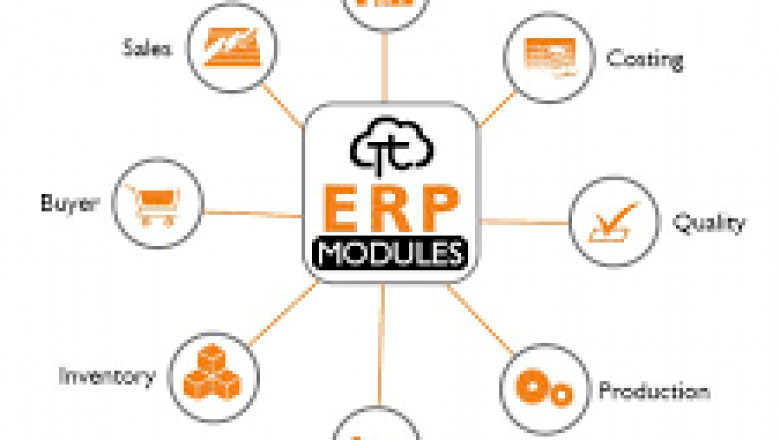views
Introduction
In today’s fast-paced business environment, companies are constantly seeking ways to streamline their operations and improve productivity. One technology that has revolutionized how businesses manage their resources is the ERP system. Particularly in Dubai—a global business hub—the adoption of ERP systems is accelerating as companies aim to stay competitive and agile. This blog post will explore what an ERP system is, how the ERP system in Dubai is transforming local businesses, and why investing in one could be a game-changer for your organization.
What is an ERP System?
Understanding ERP
ERP stands for Enterprise Resource Planning. At its core, an ERP system is a software platform designed to integrate and automate essential business processes across various departments, including finance, HR, supply chain, manufacturing, sales, and customer service.
By centralizing data and workflows, ERP systems eliminate information silos, reduce errors, and enable real-time decision-making. This integration ensures all parts of the business are aligned and working efficiently toward common goals.
Key Features of ERP Systems
-
Centralized Database: All data is stored in one unified system, ensuring consistency.
-
Automation of Tasks: Routine tasks like payroll, order processing, and inventory tracking are automated.
-
Real-Time Reporting: Instant access to performance metrics helps managers make informed decisions.
-
Scalability: ERP systems can grow with your business, supporting new functions and users.
-
Customization: Many ERP solutions offer industry-specific modules and customizable features.
Why Businesses Need ERP
In an era of globalization and rapid technological change, businesses face increasing complexity. Managing disparate software and manual processes can lead to inefficiencies and lost opportunities. ERP systems provide a framework to handle complexity, improve compliance, and foster innovation.
ERP System in Dubai: A Growing Trend
Dubai’s Business Landscape
Dubai has emerged as a strategic business hub bridging the East and West. It boasts a diverse economy spanning finance, logistics, tourism, manufacturing, and technology. This growth has spurred a demand for efficient business solutions like ERP systems to support large-scale and SME operations alike.
Why Dubai Businesses Choose ERP
-
Multinational Operations: Many companies operate across multiple countries, requiring integrated systems.
-
Regulatory Compliance: ERP helps businesses adhere to UAE’s regulatory frameworks, such as VAT and labor laws.
-
Market Agility: ERP systems enable quick adaptation to market changes, essential in Dubai’s competitive environment.
-
Digital Transformation Initiatives: Dubai’s government promotes digital innovation through initiatives like Smart Dubai, encouraging businesses to adopt advanced IT solutions including ERP.
Popular ERP Providers in Dubai
Several global and local ERP providers serve the Dubai market, offering tailored solutions:
-
SAP
-
Oracle NetSuite
-
Microsoft Dynamics 365
-
Odoo
-
Focus Softnet (a UAE-based ERP provider)
ERP Implementation Challenges in Dubai
While ERP adoption grows, companies face challenges such as:
-
High Implementation Costs: Initial setup can be expensive.
-
Change Management: Training staff and adapting workflows takes time.
-
Customization Complexity: Tailoring ERP to unique business needs requires expertise.
However, these challenges are outweighed by the long-term benefits of operational efficiency and data-driven growth.
How to Choose the Right ERP System for Your Dubai Business
Assess Your Business Needs
Start by identifying pain points in your current operations—whether it’s inventory tracking, financial reporting, or customer management. List must-have features versus nice-to-have options.
Consider Industry-Specific Solutions
Certain industries in Dubai, such as construction or hospitality, benefit from ERP systems designed specifically for their workflows.
Evaluate Vendor Support and Training
Strong local vendor support ensures smooth implementation and ongoing assistance.
Budget and Scalability
Choose an ERP system that fits your budget but can scale as your business grows.
Cloud vs On-Premise ERP
Dubai businesses are increasingly adopting cloud ERP solutions for flexibility and remote access.
Benefits of Using an ERP System in Dubai
Improved Productivity and Collaboration
ERP systems unify departments, fostering collaboration and reducing duplication of work.
Real-Time Data and Insights
Access to real-time analytics helps companies respond swiftly to market trends.
Enhanced Customer Experience
Integrated CRM modules within ERP improve customer service and retention.
Regulatory Compliance and Reporting
ERP simplifies compliance with Dubai’s VAT, labor laws, and financial regulations.
Cost Savings and ROI
Though upfront costs exist, ERP systems reduce waste and optimize resource allocation, delivering strong return on investment.
ERP System Trends in Dubai for 2025 and Beyond
AI and Machine Learning Integration
Modern ERP platforms incorporate AI to predict demand, optimize inventory, and automate routine decisions.
Mobile ERP Access
Mobile-friendly ERP apps empower Dubai’s remote and field workforce.
Increased Cloud ERP Adoption
Cloud solutions lower IT costs and facilitate rapid deployment.
Focus on Cybersecurity
As cyber threats rise, ERP vendors enhance data protection features.
Greater Customization and Modularity
Businesses prefer ERP systems that allow modular implementation to start small and expand.
Conclusion
The ERP system is no longer a luxury but a necessity for businesses in Dubai looking to maintain a competitive edge in a dynamic market. From streamlining operations to ensuring compliance and fostering innovation, ERP systems offer unparalleled advantages. By understanding what an ERP system is and how it functions within Dubai’s unique business environment, companies can make informed decisions that drive efficiency and growth.
Frequently Asked Questions (FAQs)
-
What is the basic function of an ERP system?
An ERP system integrates all core business processes into a single unified system, facilitating real-time data sharing and improving operational efficiency. -
Why is ERP important for businesses in Dubai?
ERP helps Dubai businesses manage complex operations, comply with regulations like VAT, and remain competitive in a rapidly evolving market. -
Can small businesses in Dubai benefit from ERP systems?
Yes, many ERP vendors offer scalable solutions tailored for small and medium enterprises (SMEs) to optimize resources and growth. -
What are common challenges in ERP implementation in Dubai?
Challenges include high costs, change management, and customizing the system to meet specific business needs. -
Is cloud-based ERP better than on-premise for Dubai businesses?
Cloud ERP offers greater flexibility, lower upfront costs, and easier updates, making it a popular choice in Dubai’s fast-paced business environment.














Comments
0 comment